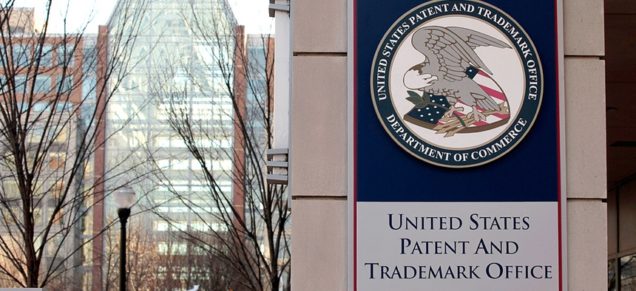Tagged: Patents
Inter Partes Review: non-Article III Adjudication of Private Property Rights
In November 2017, the Supreme Court heard oral arguments for Oil States Energy Services, LLC v. Greene’s Energy Group. Oil States poses a question that forces the Supreme Court to consider whether it will turn patent strategy on its head: whether inter partes reviews (IPRs) violate the Constitution by extinguishing private property rights through a non-Article III forum without a jury. The Federal Circuit is notoriously the appellate circuit most reversed by the Supreme Court – by May 2017, the Court had reversed 25 of the 30 cases it accepted from the Federal Circuit. Will Oil States suffer the same fate?
An IPR, established as one of the cornerstones of the American Invents Acts (AIA) in 2011 and initiated in 2012, is a proceeding instituted by the U.S. Patent and Trademark Office (USPTO), upon petition by an outside party, allowing parties to challenge the validity of an issued patent before the Patent Trial and Appeals Board (PTAB), a non-Article III tribunal. Congress created IPRs primarily to increase the efficiency of an otherwise expensive and time consuming traditional patent validity challenge in court. While traditional patent litigation may consume millions of dollars and years of the parties’ time – a waste of financial and judicial resources and creating uncertainty within the field of technology encompassed by the patent – an IPR typically costs the parties a comparatively small six figure sum and the AIA requires the PTAB to issue a final written decision within one year of IPR institution.
Since 2012, IPRs have become a popular mechanism for parties to challenge the validity of patents – in part due to their efficiency and in part because the PTAB does not begin with a presumption of validity, whereas courts do. In effect, the PTAB has invalidated all claims of the challenged patent in over 1,200 proceedings, roughly 74% of all IPRs. Only 13% of IPRs result in no claims of a patent being invalidated.
The courts have already disposed of numerous challenges to the constitutionality of patent validity review procedures conducted before the USPTO. Before the AIA introduced IPRs, the USPTO had already been invalidating patents since 1981 via ex-parte reexamination. The Federal Circuit has repeatedly affirmed the constitutionality of the USPTO’s authority in such proceedings, stating that “[a] defectively examined and therefore erroneously granted patent must yield to the reasonable Congressional purpose of facilitating the correction of governmental mistakes.” Patlex Corp. v. Mossinghoff, 758 F.2d 594, 604 (Fed. Cir. 1985). The Federal Circuit has more recently denied a similar constitutional challenge to IPRs, stating that patent rights are public rights, reviewable by an administrative agency, and therefore assigning review of patent validity to the USPTO is consistent with Article III. MCM Portfolio LLC v. Hewlett-Packard Co., 812 F.3d 1284, 1291 (Fed. Cir. 2015).
Oil States challenged IPRs alleging a violation of both Article III and the Seventh Amendment. Concerning Article III, Oil States argued that it is unconstitutional for a non-Article III court / Article I tribunal to adjudicate private property. Oil States argued that the Seventh Amendment guarantees patent owners the right to a jury trial because historically, patent infringement cases have been heard in courts of law in England before juries.
Oil States argued that the Supreme Court has once before reviewed and disavowed USPTO patent validity review procedures (otherwise, the Court has only denied certiorari in the past to review Federal Circuit decisions treating the question, including the two above decisions) and the differences in the statutorily created IPR and ex parte reexamination.
In 1898, the Supreme Court held that “the Patent Office has no power to revoke, cancel, or annul” an issued patent. McCormick Harvesting Mach. Co. v. Aultman & Co., 169 U.S. 606 (1898). However, this case did not concern the constitutionality of such proceedings, and it is likely that the Court will limit McCormick to the narrow position that the USPTO does not exercise jurisdiction over an issued patent in the absence of authorization from Congress, as was lacking in 1898. Now that Congress has expressly authorized such review via the AIA, the Court will likely find such review constitutional.
Oil States highlights the differences between AIA-created IPRs and ex parte reexaminations; IPRs are adversarial proceedings including discovery, briefings, hearings, and a final judgment, whereas ex parte reexaminations are more akin to interactive proceedings between the agency and patent owner.
To resolve this case, the Court will likely stay away from disclaiming the statutory distinctions establishing IPRs as trial-like proceedings, because these hold some legitimacy, and focus on whether a patent is a public or private right. If a patent is a public right, then there is no issue with IPRs being trial-like proceedings conducted before non-Article III adjudicators because it is proper for an agency to adjudicate a public regulatory scheme. If, on the other hand, patents are private rights, as Oil States contends, then the Court would be forced to either disavow IPRs or distinguish their characteristics from a trial. The Federal Circuit provided the Court with a mirror distinguishing IPRs from traditional trials, but this distinction is fragile at best. Ultratec, Inc. v. Captioncall, LLC, 2017 WL 3687453, *1 n.2 (Fed. Cir. Aug. 28, 2017). The Court would find more stable grounding classifying patents as quintessential public rights, conferred only by virtue of a statute.
The most curious note regarding the Supreme Court’s decision to hear Oil States is that it concurrently agreed to hear SAS Institute v. Lee, which asks the Court to consider whether the AIA permits the USPTO to select claims from a petition and partially institute an IPR or whether the USPTO must wholly grant or deny a petition, either blessing or damning all claims. If the Court intends to destabilize the AIA and declare IPRs unconstitutional, why consider the USPTO’s duty to the petitioner for an IPR in the same term? It is likely that the Supreme Court will uphold the constitutionality of the AIA’s grant of authority to the USPTO and permit IPRs to continue, but will use these two cases as an opportunity to either limit the scope and effect of IPRs or force clarity regarding the deficiencies of IPRs – such as lacking judicial rules of ethical conduct, improper handling of evidence, improper handling of amendments, or simply disregarding established standards in favor of PTAB-created standards.
Eric Dunbar anticipates graduating Boston University School of Law in May 2018.


